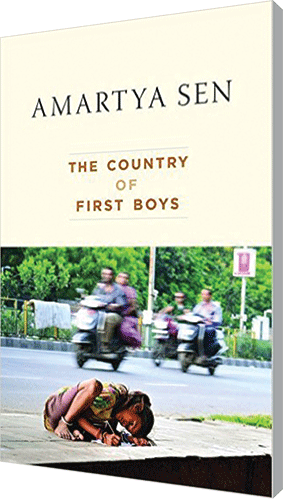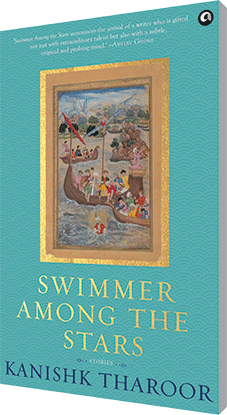Wish list essays
 The Country Of First Boys And Other Essays by Amartya Sen Oxford University Press; Price:Rs.550; Pages: 276
The Country Of First Boys And Other Essays by Amartya Sen Oxford University Press; Price:Rs.550; Pages: 276
This collection of essays written at various points by erudite economics Nobel laureate Dr. Amartya Sen, stimulates thought and reflection while being easy to read because of the conversational style and ironic humour, that distinguishes India’s arguably most-loved writer on the dismal science that’s economics.
The selection of 13 seminal essays spanning almost 15 years, cover a wide range of subjects. Essays intriguingly titled ‘India through its Calendars’ (“The study of calendars and their history, usage and social associations can provide a fruitful understanding of important aspects of a country and its cultures”) to ‘On Nalanda University’ which details the multinational proposal to revive the world’s oldest university (estb.500 BCE), and the author’s role as its first chancellor and his premature resignation in February 2015 prompted by the election of the BJP-NDA government at the Centre. Stringing these diverse essays together is what Sen describes as a non-sectarian concern about the development of India in terms of “equity and justice, in different areas of human life — social, political, economic, cultural and intellectual”.
The book’s title refers to a critique of our current education system, its deficiencies in coverage and quality, as well as its privileging of the few. Its massive disparity and gender imbalance manifests itself in the “huge mess” that is Indian education.
Meanwhile, Western corporates snapping up the best “first boys” — successful products of India’s premier colleges and institutions — believe that India’s education system is a spectacular success. Countering this, the author addresses the country’s class rather than mass education system which neglects the primary education of a huge number of children to focus on first boys who are quick to emigrate given the first opportunity.
The aggregative penalty of vast education disparity is that compared to Asian peers like China, South Korea, Taiwan or Thailand, India lags behind with a sparsely educated labour force. Lack of education and stark illiteracy affects employment, legal rights enforcement, political disenfranchisement and health of citizens, argues Sen.
Sen’s primary academic studies in welfare economics and social choice theory have often highlighted the economic fallout of famine, hunger and poverty and addressed issues of economic and social justice. Essays titled ‘Hunger: Old Torments and New Blunders’ and ‘Poverty, War and Peace’, included in this compendium reiterate his humane concerns about “hardened inequalities in Indian society” and the urgent need to overcome the multiple injustices suffered by the huge majority of free India’s citizens.
A recurring theme in these essays is the author’s sense of an expansive syncretic India, grounded in the wisdom of its cultural traditions which are being over-shadowed by narrow-mindedness and intolerance, communal animosity, a spillover from days of the Partition to contemporary times. Advocating democratic dialogue, the author takes on the media in an essay titled ‘Why Media is Important for Economic Development’ for bias and inaccuracy.
Acknowledging that press freedom — “along with other democratic freedoms” — has helped independent India to avoid major famines altogether unlike the Soviet Union and China (an invaluable argument of the author in favour of democracy), he nevertheless expresses dismay about “systematic bias in the press”. “… Important deprivations (such as endemic under-nourishment or inadequate healthcare) have not received the attention they deserve from the Indian press,” writes Sen.
In the penultimate essay, ‘A Wish a Day for a Week’, Sen’s vision of a vibrant India is expressed through an allegory in which he reports himself asking for the grant of seven wishes from the Goddess of Medium Things (GMT). The wishes: serious cultivation of classical studies for balanced education; a right-wing political party that’s secular and non-communal; more clear-minded and development-oriented left wing parties; media that’s more responsive to the needs of poorest people; decent schools, healthcare, nourishment, sanitation; good higher education and sustainable environment (a bundled one wish); decriminalisation of homosexuality and a final prayer to make India more gender equal and “less defeatist”.
The last request exasperates GMT who remarks that “It has to be Indians who change their defeatist mindset,” and dismisses Sen to the Jaipur Litfest.
The essays in the book defy generic categorisation and are eclectic in theme. Elements of self-revelation, individual taste, a sense of urgency and conviction are woven into the voice of an exceptional individual. As Sen explains in an essay titled ‘The Play’s the Thing’, games, jest and playfulness “can provide recreation… help us stay healthy… stimulate our imagination… can also give us ideas and visions”. Discovering meaningful playfulness is the key to reading these essays which cover serious development and democracy issues with a combination of gravitas and jest.
Jayati Gupta
Impressive debut
Swimmer Among The Stars by Kanishk Tharoor Aleph Book Company; Parge: Rs.499; Pages: 208
The eponymous story in this collection — a minor galaxy, to further the metaphor the title introduces — traces an encounter with the last speaker of a language, an ailing elderly woman in an unnamed location. All we can glean is that she is remote — geographically, culturally, and of course, linguistically — from a team of young researchers who arrive with their machines to record that which is inherently impossible — ‘speech’ in a language of which she is the last remaining speaker.
Each story in this collection could be read as an optimistic engagement with translation, and with travel, its twin. The stories bear testimony to Kanishk Tharoor’s own travels, his engagement with vivid cultures, places and times.
Born and raised in New York, he inflects an Indian-American sensibility in his engagement with concerns we could describe as broadly postcolonial. The apparently autobiographical ‘A Lesson in Objects’ that turns a reflexive gaze on the quotidian details of an Indian-origin student on an American university campus, stands out for the use of the first person singular.
Geographically, most stories tend to hover around the Mediterranean and Central Asia, though some foray into China and one even ventures into space! Tharoor borrows from pre-modern traditions of storytelling, especially the imaginative worlds of the Arabian Nights sequence of which Salman Rushdie’s Haroun and the Sea of Stories would be a contemporary echo. Like Amitav Ghosh, who has written admiringly of this collection, he has a predilection for broad historical sweeps and anthropological detail, backed in some cases by dates and records.
Though ‘completion’ hardly describes the dreamy drift of his narrative style that prefers the suggestive fragment to the finished statement, one narrative technique the writer adopts is to imaginatively ‘complete’ received, unfinished, narratives. Thus we see what Odysseus really does when he returns to Ithaca, after slaughtering his wife’s suitors and re-establishing his claim to wife and throne. For, hidden earlier in the Homeric epic is Tiresias’ injunction that Odysseus “must carry an oar deep into the hinterland until he reaches a place where people have not heard of the sea”. The Odyssey awaits Tharoor’s brief ‘sequel’, as he lays claim to a heritage of world literature.
With a hero from the past, Odysseus, land-locked, and humanity’s future hanging in Trishanku-like balance, an ironic variant on nautical success is reserved for a Malayali mahout and his elephant, transported all the way from Kerala to Morocco to satisfy the whims of a princess who lost her heart to the pachyderm she saw in a zoo. ‘Elephant at Sea’ is a story that mimics the pace and scale suitable to its subject, with Tharoor’s trademark blend of history and humour.
The delicately poignant ‘The Fall of an Eyelash’ captures what could be seen as a prose rendition of the sentimental traditions of Persian poetry, the traumas and uncertainties of contemporary migration and forced exile, as a sister makes a wish for the safe passage of her brother making his way into the unnamed European country where she has created a tentative new life, on the edge of belonging. In omitting the specifics, the story allows itself to be read as an affectively charged parable for current refugee crises.
Human encounters — occasioned by war, trade, economic necessity, greed, curiosity, ambition, love — form Tharoor’s themes, and reflections on questions of civilisation and barbarity, power and love, across history and myth, underpin it.
Legends lie scattered across this sea of stories, which extends their latent possibilities, drawing the reader into the palimpsest of half-remembered pasts, luminously imagined and re-told. The embarrassing hyperbole of some of the blurbs notwithstanding, the book is an impressive debut.
Maya Joshi (The Book Review, June 2016)















Add comment